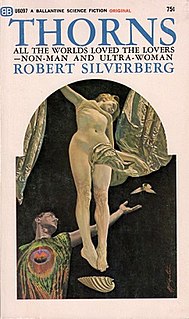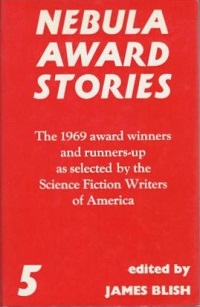External links
| This article about a literature character is a stub. You can help Wikipedia by expanding it. |
Kelvin R. Throop (also 'Kelvin R. Throop III' or 'Kelvin Throop III') is a fictional character and collective pseudonym created by R. A. J. Phillips in a story which appeared in Analog Science Fiction and Science Fact magazine in July 1964. With the encouragement of editor John W. Campbell, Throop subsequently figured in additional stories by other authors. The archetypal Throop story finds him within a large bureaucracy which, solely by his acid-penned memos, he causes to self-destruct, whereupon he disappears until the next story. In mid-December 1984, Analog published a special Kelvin Throop humor edition. Numerous humorous epigrams attributed to Throop were published in Analog over a period of decades.
| This article about a literature character is a stub. You can help Wikipedia by expanding it. |

Harry Clement Stubbs, better known by the pen name Hal Clement, was an American science fiction writer and a leader of the hard science fiction subgenre. He also painted astronomically oriented artworks under the name George Richard.

John Wood Campbell Jr. was an American science fiction writer and editor. He was editor of Astounding Science Fiction from late 1937 until his death and was part of the Golden Age of Science Fiction. Campbell wrote super-science space opera under his own name and stories under his primary pseudonym, Don A. Stuart. Campbell also used the pen names Karl Van Kampen and Arthur McCann. His novella Who Goes There? was adapted as the films The Thing from Another World (1951), The Thing (1982), and The Thing (2011).

William Thomson, 1st Baron Kelvin, was an Irish-Scottish mathematical physicist and engineer who was born in Belfast in 1824. At the University of Glasgow he did important work in the mathematical analysis of electricity and formulation of the first and second laws of thermodynamics, and did much to unify the emerging discipline of physics in its modern form. He worked closely with mathematics professor Hugh Blackburn in his work. He also had a career as an electric telegraph engineer and inventor, which propelled him into the public eye and ensured his wealth, fame and honour. For his work on the transatlantic telegraph project he was knighted in 1866 by Queen Victoria, becoming Sir William Thomson. He had extensive maritime interests and was most noted for his work on the mariner's compass, which previously had limited reliability.
Gordon Rupert Dickson was a Canadian-American science fiction writer. He was inducted into the Science Fiction and Fantasy Hall of Fame in 2000.

Dallas McCord "Mack" Reynolds was an American science fiction writer. His pen names included Dallas Ross, Mark Mallory, Clark Collins, Dallas Rose, Guy McCord, Maxine Reynolds, Bob Belmont, and Todd Harding. His work focused on socioeconomic speculation, usually expressed in thought-provoking explorations of utopian societies from a radical, sometime satiric perspective. He was a popular author from the 1950s to the 1970s, especially with readers of science fiction and fantasy magazines.
Throop may refer to:
Vonda Neel McIntyre was an American science fiction author.

A science fiction magazine is a publication that offers primarily science fiction, either in a hard-copy periodical format or on the Internet. Science fiction magazines traditionally featured speculative fiction in short story, novelette, novella or novel form, a format that continues into the present day. Many also contain editorials, book reviews or articles, and some also include stories in the fantasy and horror genres.
Edward M. Lerner is an American author of science fiction, techno-thrillers, and popular science.
William F. Wu is a Chinese-American science fiction, fantasy, and crime author. He had his first professional fiction publication, a short story, in 1977. Previous to that, he had letters published on comic books and articles in comics fanzines. Since then, Wu his traditionally published books include 13 novels, one scholarly work, and a collection of short stories. His more than seventy published works of short fiction have been nominated for the Hugo Award twice individually and once as a member of the Wild Cards group of anthology writers; his work has been nominated for the Nebula Award twice and once for the World Fantasy Award. His short story "Goin' Down to Anglotown" was a finalist for the Sidewise Award and Canada's Aurora Award. He is also the author of "Hong on the Range," a novel that incorporates his award-nominated short story "Hong's Bluff," and "MasterPlay," in 1987, about computer wargamers. The latter is based on his 1979 novelette "On the Shadow of a Phosphor Sheen." He has written novels using the Three Laws of Robotics invented by Isaac Asimov, including two entries in the Robot City series and the entire Robots in Time series. The two series in Asimov's universe were written to Young Adult standards, though they are not labeled as such. The latter was the first series licensed from Asimov's estate after his death.

The Collected Stories of Vernor Vinge is a collection of science fiction short stories by American writer Vernor Vinge. The stories were first published from 1966 to 2001, and the book contains all of Vinge's published short stories from that period except "True Names" and "Grimm's Story".
Kelvin is a masculine given name, ultimately derived from the title of William Thomson, 1st Baron Kelvin, who received a baronage named for the River Kelvin in 1892. Isolated use of "Kelvin" as a given name is recorded in England in the 1920s, and the name rises in popularity in the United States around 1950, according to the authors of the Oxford Dictionary of First Names possibly by association with the similar-sounding Kevin, which surged in popularity at about the same time, and maybe further influenced by Calvin and Melvin. In the United States the name peaked in popularity at rank 209 in 1961 and has declined steadily since, dropping to rank 726 as of 2016.

Thorns is a science fiction novel by American author Robert Silverberg, published as a paperback original in 1967, and a Nebula and Hugo Awards nominee.

Analog Science Fiction and Fact is an American science fiction magazine published under various titles since 1930. Originally titled Astounding Stories of Super-Science, the first issue was dated January 1930, published by William Clayton, and edited by Harry Bates. Clayton went bankrupt in 1933 and the magazine was sold to Street & Smith. The new editor was F. Orlin Tremaine, who soon made Astounding the leading magazine in the nascent pulp science fiction field, publishing well-regarded stories such as Jack Williamson's Legion of Space and John W. Campbell's "Twilight". At the end of 1937, Campbell took over editorial duties under Tremaine's supervision, and the following year Tremaine was let go, giving Campbell more independence. Over the next few years Campbell published many stories that became classics in the field, including Isaac Asimov's Foundation series, A. E. van Vogt's Slan, and several novels and stories by Robert A. Heinlein. The period beginning with Campbell's editorship is often referred to as the Golden Age of Science Fiction.

The 1981 Annual World's Best SF is an anthology of science fiction short stories edited by Donald A. Wollheim and Arthur W. Saha, the tenth volume in a series of nineteen. It was first published in paperback by DAW Books in May 1981, followed by a hardcover edition issued in August of the same year by the same publisher as a selection of the Science Fiction Book Club. For the hardcover edition the original cover art of Michael Mariano was replaced by a new cover painting by John Gampert.

The Best Science Fiction of the Year #10 is an anthology of science fiction short stories edited by Terry Carr, the tenth volume in a series of sixteen. It was first published in paperback by Pocket Books in July 1981, and in trade paperback and hardcover and trade paperback by Gollancz in the same year.

A Song for Lya is the first collection of stories by science fiction and fantasy writer George R. R. Martin, published as a paperback original by Avon Books in 1976. It was reprinted by different publishers in 1978 and in 2001. The title is sometimes rendered A Song for Lya and Other Stories. A Song for Lya won the 1977 Locus Poll as the year's best story collection.

Nebula Award Stories 7 is an anthology of award-winning science fiction short works edited by Lloyd Biggle, Jr. It was first published in the United Kingdom in hardcover by Gollancz in November 1972. The first American edition was published by Harper & Row in January 1973; a Science Fiction Book Club edition, also in hardcover, followed in March of the same year. Paperback editions followed from Harrow Books in the U.S. in 1973, and Panther in the U.K. in December 1974. The American editions bore the variant title Nebula Award Stories Seven. The book has also been published in German.

Nebula Award Stories 5 is an anthology of award-winning science fiction short works edited by James Blish. It was first published in the United Kingdom in hardcover by Gollancz in November 1970. The first American edition was published by Doubleday in December of the same year. Paperback editions followed from Pocket Books in the U.S. in January 1972, and Panther in the U.K. in December 1972. The American editions bore the variant title Nebula Award Stories Five. The book has also been published in German.

Space Mail is an anthology of science fiction short works edited by Isaac Asimov, Martin H. Greenberg, and Joseph Olander. It contains a series of short stories written in the form of letters, diary entries, or memoranda. The book is broken into three sections, each of which contains stories written in the type of documentation after which the section is named.